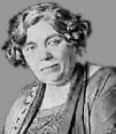|
Two feminists on opposite sides of the issue
|
|

|

|
|
Susan B. Anthony
(1820-1906)
The tireless American fighter for a woman’s right to vote was opposed to abortion.
|
Helene Stöcker
(1869-1943)
The German fighter for the rights of unmarried mothers demanded the right to abortion.
|
|
|
|
Abortion and the Law
The attitude of the early Christians was the same as that of the Hippocratic oath: Abortion was not acceptable. It was a grave sin, and the legal codes in Christian countries made it a punishable offense. However, well into modern times, the law was rarely enforced. In any case, it was generally believed that a fetus did not have a life of its own until its "quickening", i.e. the time when the expectant mother can feel its movements inside her womb (sometime after the 16th week of pregnancy). This was also believed to be the time of “ensoulment”, i.e. the moment when the soul entered the fetal body. However, beginning in the 19th century, more and more American and European governments strengthened their antiabortion laws, a move supported by the medical profession and some early feminists. On the other hand, at the turn of the 20th century, many physicians, appalled by an increasing number of botched, illegal abortions, began to have second thoughts, and a new generation of feminists began to demand the abolition of such laws. They proclaimed "a woman's right to her own body" as well as access to contraception and sex education. |